Mark Anthony Neal's Blog, page 1008
April 9, 2012
Alexis Pauline Gumbs on the Empowering Force of Feminist Teaching
Black Issues Forum | WUNC-TV
Empowering Force of Feminist Teaching
Often praised for their strength, many black women nonetheless suffer lives of victimization and oppression. Author and black feminist activist Dr. Alexis Pauline Gumbs uses black feminist thought in her intergenerational self-empowerment workshops. Hear her strategy.
Published on April 09, 2012 18:22
Trayvon Martin and the Rebirth of a Nation | University of Wisconsin at Milwaukee: April 10, 2012

Rap Sessions and the League of Young Voters Present
Trayvon Martin and the Rebirth of a Nation:
The Black Image in the American Mind
University of Wisconsin at Milwaukee
6-9pm cst | Union Ballroom
Free and open to the public
Watch the live stream at http://www.ustream.tv/leagueofyoungvoters
From entertainment and politics to the media images that accompany them, the civil-rights era idea of "Blackness" is currently in flux. A panel of leading national experts will explore contemporary moments in popular cultural and politics where race, image and identity have taken center stage. This discussion seeks to help students look at hip-hop culture as a cross-racial phenomenon that has political and cultural roots in black and brown communities.
Tweet @TheLeague99 using the hashtag #RapSessions to join the conversation.
The panelists include:
Moderator: Bakari Kitwana (@therealbakari)Mark Anthony Neal (@newblackman)Joan Morgan (@milfinainteasy)Elizabeth Mendez Berry (@mendezberry)John Jennings (@JIJennings)Biko Baker (@bikobaker)[image error]
Published on April 09, 2012 12:20
April 8, 2012
Legendary Black Coaches Weigh in on Trayvon Martin
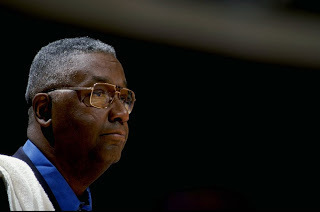
To: EricHolder, United States Attorney General
We urge the immediate implementation of all prescribed legaland judicial actions and options applicable in establishing the circumstancesof Trayvon Martin's death and in bringing the person responsible to justice. Wealso request an immediate review of how the Trayvon Martin case was handled byresponsible law enforcement officials and by the hierarchy of civil officialsto whom those law enforcement personnel were ultimately accountable. As devastating as the senseless killingof this young man is, worse is the impression left in its wake that the institutionalmachinery of justice has been utterly dismissive of his tragic death and evensupportive of the acknowledged killer to the point of excusing, if not outright"covering up" his culpability.
It is our conviction that the smiling young man so widelypictured in his athletic uniform and his family deserve more than to beconsigned to the status of yet another "statistic". They and this nation, deserve and demand justice - nothingmore, nothing less.
Dr. Harry EdwardsCoach George RavelingCoach John ThompsonCoach John ChaneyCoach Nolan Richardson[image error]
Published on April 08, 2012 18:58
'Black Radio' and the State of Contemporary Black Music on the April 9th Left of Black
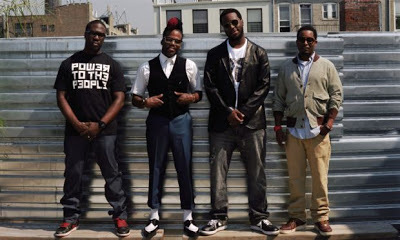 Bassist Derrick Hodge on the far left
Bassist Derrick Hodge on the far left'Black Radio' and the Stateof Contemporary Black Music on the April 9th Left of Black
Host and Duke University Professor Mark Anthony Neal is joined in personby Philadelphia's own DerrickHodge, bassist for the RobertGlasper Experiment and longtime musical director for R&B artist Maxwell at the John Hope Franklin Center for International and InterdisciplinaryStudies. Hodge discusses working as a musician in high school with few resources, andrecounts his experiences working with various artists' including Lupe Fiasco,Bilal, Common, Kanye West, and J-Dilla. Hodge's talks about his biggest influencesas a musician, including that of the Philadelphia sound, and the significance ofthe Experiment's new recording BlackRadio. Hodge may be most well known, among Hip-hop fans, for thebass solo that open Common's "Be."
***
Left of Black airs at 1:30 p.m. (EST) on Mondays on the Ustreamchannel: http://www.ustream.tv/channel/left-of-black. Viewers are invited to participate in a Twitterconversation with Neal and featured guests while the show airs using hash tags#LeftofBlack or #dukelive.
Left of Blackis recorded and produced at the John Hope Franklin Center of International andInterdisciplinary Studies at Duke University.
***
Follow Left of Black onTwitter: @LeftofBlackFollow Mark Anthony Neal onTwitter: @NewBlackManFollow Derrick Hodge on Twitter: @DerrickHodge
###
Published on April 08, 2012 17:48
The (Digital) State of Black Studies
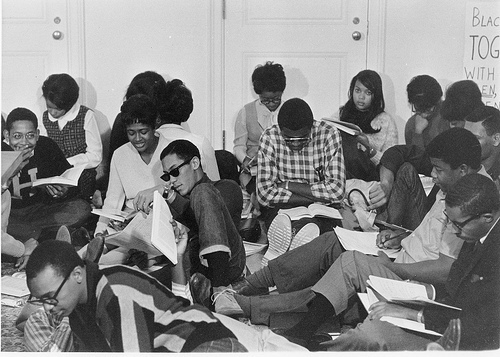
The State of Things with Frank Stasio | WUNC
The State of Black Studies
Black studies has been an important academic field since its inception in the 1960s, but cases like the shooting of Trayvon Martin have thrown in our collective faces its continued relevance today. In a world with a black president, some people muse out loud that we are post-racial. That we don't need to spend resources on something like black studies. Indeed, the programs are fighting for their lives at some public universities around the country. It's in this climate, that Duke University is hosting a conference on black studies. It's called "Black Thought 2.0: New Media and the Future of Black Studies." Host Frank Stasio talks about the Black Thought conference and the state of black studies with Mark Anthony Neal, a professor of black popular culture in Duke University's African & African-American Studies program; and Kimberly Ellis, a writer, playwright, actress and particpant in the conference.
Listen Here
Published on April 08, 2012 12:54
The State of Black Studies

The State of Things with Frank Stasio | WUNC
The State of Black Studies
Black studies has been an important academic field since its inception in the 1960s, but cases like the shooting of Trayvon Martin have thrown in our collective faces its continued relevance today. In a world with a black president, some people muse out loud that we are post-racial. That we don't need to spend resources on something like black studies. Indeed, the programs are fighting for their lives at some public universities around the country. It's in this climate, that Duke University is hosting a conference on black studies. It's called "Black Thought 2.0: New Media and the Future of Black Studies." Host Frank Stasio talks about the Black Thought conference and the state of black studies with Mark Anthony Neal, a professor of black popular culture in Duke University's African & African-American Studies program; and Kimberly Ellis, a writer, playwright, actress and particpant in the conference.
Listen Here
Published on April 08, 2012 12:54
Melissa Harris Perry on Student Walkout at Detroit's Frederick Douglass Academy
Published on April 08, 2012 11:09
Khalil Gibran Muhammad: "Playing the Violence Card"
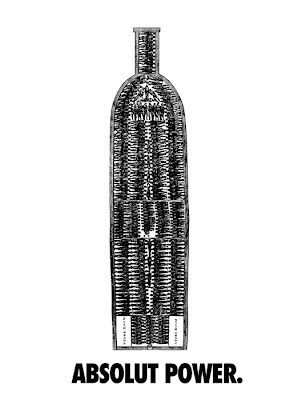 Hank Willis Thomas--"Absolute POwer" (2003)
Hank Willis Thomas--"Absolute POwer" (2003)Playing the Violence Card by Khalil Gibran Muhammad | The New York Times
EVER since the culture wars of the 1980s, Americans have been familiar with "the race card" — an epithet used to discredit real and imagined cries of racism. Less familiar, however, is an equally cynical rhetorical tactic that I call "the violence card."
Here's how it works. When confronted with an instance of racially charged violence against a black person, a commentator draws attention to the fact that there is much more black-on-black violence than white-on-black violence. To play the violence card — as many criminal-justice advocates have done since the Rodney King police brutality case of the early 1990s — is to suggest that black people should worry more about the harm they do to themselves and less about how victimized they are by others.
The national outrage over the Trayvon Martin case has prompted some recent examples. Last week, the journalist Juan Williams wrote in The Wall Street Journal of the "tragedy" of Trayvon's death but wondered "what about all the other young black murder victims? Nationally, nearly half of all murder victims are black. And the overwhelming majority of those black people are killed by other black people." During a debate about the case on Sunday on an ABC News program, the commentator George F. Will argued that the "root fact" is that "about 150 black men are killed every week in this country — and 94 percent of them by other black men."
For Mr. Williams, Mr. Will and countless others playing the violence card, the real issue has little to do with racist fears or police practices — even though those would seem to be the very issues at hand.
But perhaps the large scale of black-on-black violence justifies playing the violence card? Not if you recall how Americans responded to high levels of white-on-white violence in the past.
Consider the crime waves of 1890 to 1930, when millions of poor European immigrants came to America only to be trapped in inner-city slums, suffering the effects of severe economic inequality and social marginalization. Around the turn of the century, the Harvard economist William Ripley described the national scene: "The horde now descending upon our shores is densely ignorant, yet dull and superstitious withal; lawless, with a disposition to criminality." But the solution, Ripley argued, was not stigma, isolation and the promotion of fear. "They are fellow passengers on our ship of state," he wrote, "and the health of the nation depends upon the preservation of the vitality of the lower classes."
As a spokesman for saving white immigrant communities from the violence within, Ripley was part of a national progressive movement led by Jane Addams, the influential social worker of the late 19th and early 20th centuries. In the face of grisly, gang-related youth shootings — "duplicated almost every morning," Addams wrote — she insisted that everyone from the elite to community organizers to police officers had a part to play.
She and other progressives mobilized institutional resources to save killers and the future victims of killers. Violent white neighborhoods were flooded with social workers, police reformers and labor activists committed to creating better jobs and building a social welfare net. White-on-white violence fell slowly but steadily in proportion to economic development and crime prevention.
In almost every way the opposite situation applied to black Americans. Instead of provoking a steady dose of compassionate progressivism, crime and violence in black communities fueled the racist belief that, as numerous contemporaries stated, blacks were their "own worst enemies" — an early version of the violence card. Black people were "criminalized" through various institutions and practices, whether Southern chain gangs, prison farms, convict lease camps and lynching bees or Northern anti-black neighborhood violence and race riots.
Racial criminalization has continued to this day, stigmatizing black people as dangerous, legitimizing or excusing white-on-black violence, conflating crime and poverty with blackness, and perpetuating punitive notions of "justice" — vigilante violence, stop-and-frisk racial profiling and mass incarceration — as the only legitimate responses.
But the past does not have to be the future. The violence card is a cynical ploy that will only contribute to more fear, more black alienation and more violence. Rejecting its skewed logic and embracing a compassionate progressive solution for black crime is our best hope for saving lives and ensuring that young men like Trayvon Martin do not die in vain.
Khalil Gibran Muhammad, director of the Schomburg Center for Research in Black Culture at the New York Public Library, is the author of The Condemnation of Blackness: Race, Crime, and the Making of Modern Urban America.
Published on April 08, 2012 10:33
From the Artist Currently Known as Troy Gua: "Le Petit Prince" (video) |
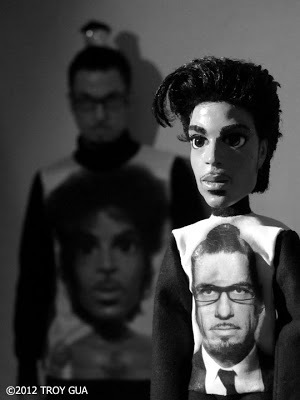
Troy Gua Artist Statement :
I consistently produce accessible and engaging conceptual work in a wide range of media, marrying the commercial and contemporary, conveying a glossy design aesthetic with a keen sense of humor. My subject matter deals with the investigation and layering of identities, cultural critique and commentary and the universal human need for recognition.
See More of Troy Gua's Work
Published on April 08, 2012 08:17
April 5, 2012
"We Do Suffer from PMS...Patriarchy, Misogyny & Sexism": Rev. Marcia Dyson talks "The War on Women"
Visit msnbc.com for breaking news, world news, and news about the economy
Rev. Marcia Dyson, Ken Vogel (Politico), and Krystal Ball Discuss Republican National Committee Chair Reince Priebus' comments about the "War on Women."
Published on April 05, 2012 20:52
Mark Anthony Neal's Blog
- Mark Anthony Neal's profile
- 30 followers
Mark Anthony Neal isn't a Goodreads Author
(yet),
but they
do have a blog,
so here are some recent posts imported from
their feed.



